The ambit of marine conservation has been enshrined in legislation for centuries past. International conventions have resulted in domestic legislation favoring conservation and criminalizing actions of pollution across several states. However, it is ironic that the measures against pollution manifested in legislation do not reflect the reality of what is happening today. Destruction, pollution, and deterioration, encompass only a few of the challenges that the oceans are exposed to on a daily basis. In the face of such adversity, lack of accountability remains a key factor in enabling pollution – as it allows the polluter to escape liability, untarnished. Despite the principles that enable legislation to hold the polluter liable, it is rare that judgements have that effect. As a result, today this remains an almost utopian ideal.
The X-Press Pearl Disaster
Deemed the ‘worst marine ecological disaster in Sri Lankan history’, the X-Press Pearl was a Singaporean container ship deployed on the Straits to the Middle East from Port Klang in Malaysia. Carrying a shipment encompassing hazardous chemicals inclusive of 300 tons of bunker oil, 46 containers of nitric acid, ethanol, and urea, 349 containers of epoxy resins, and 42 containers of sodium methoxide and caustic soda, the vessel caught fire on the 27th of May, northwest of the Colombo Port. It proceeded to sink on the 2nd of June as it was being towed to deeper waters. It is believed that the fire was caused by a nitric leak – information that the crew had been privy to several days prior to the explosion.
Applications had been made to both ports to offload a container that was leaking nitric acid, but the advice given was there were no specialist facilities or expertise immediately available to deal with the leaking acid
X-Press Feeders, 2021
Termed a ‘chemical soup’ by environmental groups, the Marine Environment Protection Authority confirmed that no residue could be found on the ship. This is evidently an attempt to downplay the disaster as several hundred tons of hazardous chemicals and oils are now present in the ocean. These chemicals individually pose catastrophic threats to the coastal ecosystem, animal species, and coastal belt of the countries in the Indian Ocean. The effects have been far reaching and have resulted in the death of hundreds of sea turtles, dolphins, and fish species. Additionally, nitric acid has damaged the coral reef and ocean bed as it is a highly corrosive chemical. Furthermore, the coastal line of Sri Lanka has been coated into obscurity with plastic nurdles. The Centre for Environmental Justice confirms that only one half of these nurdles may be effectively removed, with the other half continuing to destroy ocean life for centuries.
Inept disaster management
Sri Lanka is facing the worst plastic nurdles disaster in history
Dr. Nalaka Godahewa, State Minister, 2021
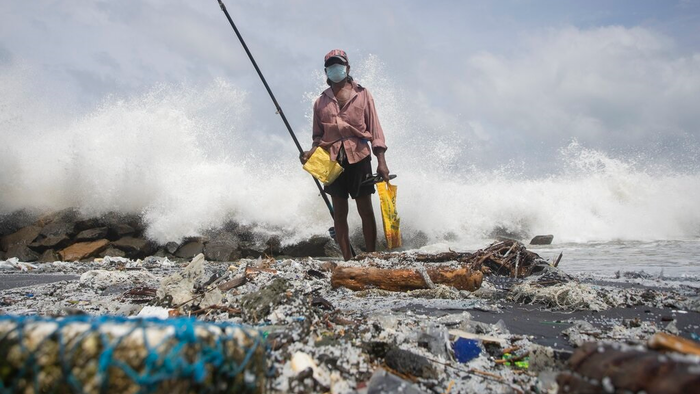
Several controversies surround the explosion and sinking of the X-Press Pearl. Of these, two remain factual and highly pertinent. Firstly, the X-Press Pearl had been denied permission by the states of Qatar and India to dock the ship there, upon encountering the nitric leak. It is following this denial that the ship had been granted entry into Sri Lanka. However, the reasoning for allowing such entry has not been justified by the state – despite the authorities being aware of a nitric leak and the extreme hazards nitric acid poses to the environment and coastal belt.
Secondly, the mechanisms deployed by the state in the face of fire were counterproductive and futile. This was demonstrated where the authorities utilized water in an attempt to douse the fire. Nevertheless, it remains industry knowledge that the amalgamation of sodium methoxide with water results in corrosive material further igniting surrounding material; information that should have been readily available prior to decision making. A myriad of factors contributed to inept disaster management in this specific scenario. These factors are inclusive of a lack of safety procedures, the inability to procure an emergency response team, insufficient lack of tools and equipment, and a lack of relevant expertise and resource personnel.
It has become apparent that the lack of legislation on the ‘ideal’ emergency response in the face of such adversity is extremely disadvantageous to the coastal ecosystems. Additionally, the primary stakeholders in addition to the coastal ecosystems are its beneficiaries. These beneficiaries are often low-income earners who are often fundamentally deprived in the face of such adversity. This is demonstrated in the aftermath of the X-Press Pearl Disaster where a ban on fishing was imposed by the state, leaving thousands of fishing families destitute.
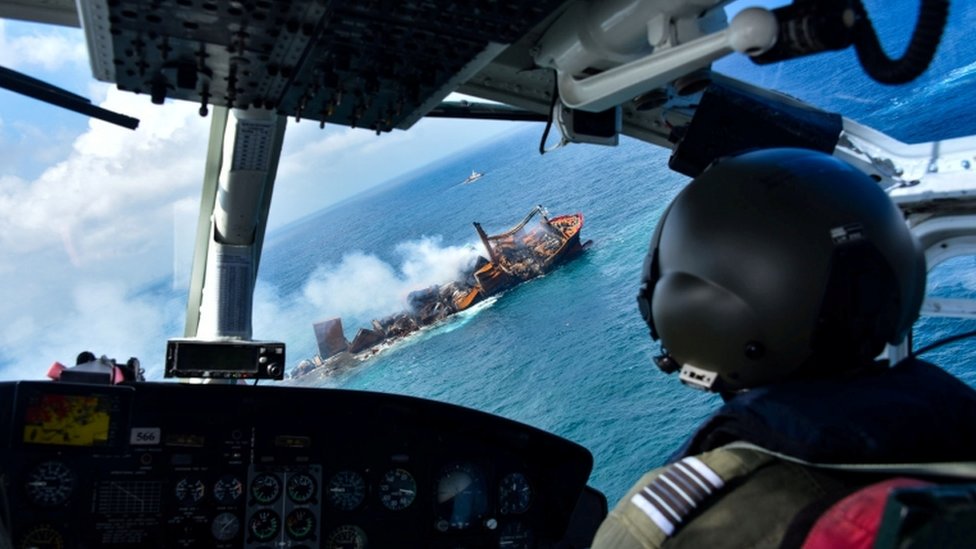
The role of International Conventions in ensuring conservation
International Conventions play a key role in ensuring the conservation of coastal ecosystems. The International Maritime Organization – the UN Institution for the development of international maritime law – is primarily responsible for the enacting of such Conventions. Its central objective is the creation of a fair, effective, generally accepted, and implemented a framework for the shipping industry. To this end, the International Maritime Organization has enacted two primary regulations: the landmark International Convention for the Prevention of Pollution from Ships otherwise known as the MARPOL Convention, and the International Convention for the Prevention of Pollution of the Sea by Oil or OILPOL.
The MARPOL Convention in mitigating risk
Ratified by Sri Lanka in 1991, the MARPOL Convention imposes regulations on all member states. These regulations are inclusive of the prevention and minimization of pollution from ships, accidental pollution, and routine operations. Additionally, the annexures of the Convention provide intricately outlined regulations for the prevention of pollution by oil, noxious liquid substances, harmful substances, and sewage. Lastly, the Convention imposes a positive obligation on other member states to assist a country in the implementation of their ‘emergency response’.
If Sri Lanka intends to develop itself as a regional maritime hub, the country needs to develop domestic capabilities to respond to situations such as this one
Rohan Masakorala, Shippers Academy, 2021
The actions of Sri Lanka that were employed to mitigate the X-Press Pearl Disaster are in clear violation of the MARPOL Convention. The failure of the state to make mandatory double hulls on oil tankers and prevent the discharge of noxious substances within 12 miles of the nearest land, is a clear breach of the obligations under the Convention. Additionally, other member states failed to assist Sri Lanka in the dousing of this fire, apart from the Indian Coast Guard. Therefore, it is apparent that there is an all-around breach of obligation. This breach of obligation is of particular significance as it makes void the progress in legislation that favored conservation. Further, it is argued that even in the circumstance that the state is able to recover monitory damages, these money claims cannot actively remedy the damage to coastal ecosystems.
While the Regional Seas Programme initiated by the UN Environment Programme and the Intergovernmental Oceanographic Commission established by UNESCO coordinates programs in marine research, hazard mitigation, and better managing ocean and coastal areas, it is clear that in the event of oceanic pollution, the measures employed by states are often counterintuitive to the objectives enshrined in International Conventions.
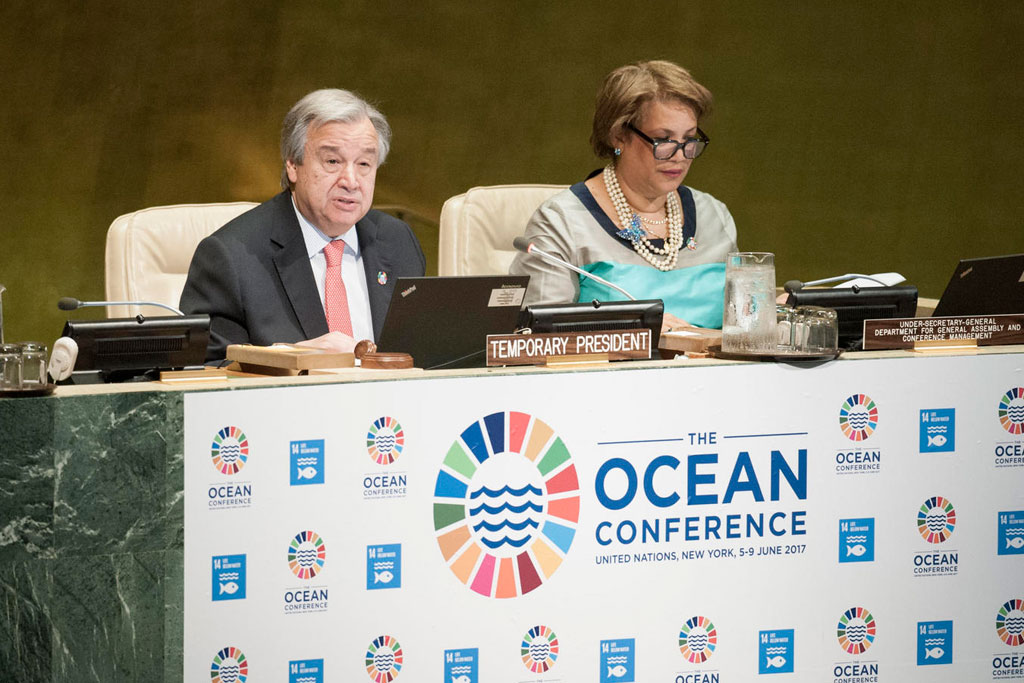
The ‘Polluter Pays’ principle
It should be the responsibility of every polluter to make amends and pay compensation for the pollution they cause.
Edwin Lau, 2020
The ‘Polluter Pays’ principle is the notion that the ‘polluter’, who has directly or indirectly harmed the environment, or created conditions that have resulted in environmental damage, should be held liable in entirety. This liability is inclusive of the polluter bearing the costs of enacting measures decided by public authorities to ensure that the environment is restored to an acceptable state, following pollution. First articulated by the Council of the Organization for Economic Co-operation and Development, the ‘Polluter Pays’ principle encompasses one of the core principles of sustainable development. Additionally, it constitutes a fundamental principle governing modern environmental law and policy enshrined in a multitude of conventions inclusive of the ‘Rio Declaration on Environment and Development’ and ‘The Hazardous and Noxious Substances Convention’.
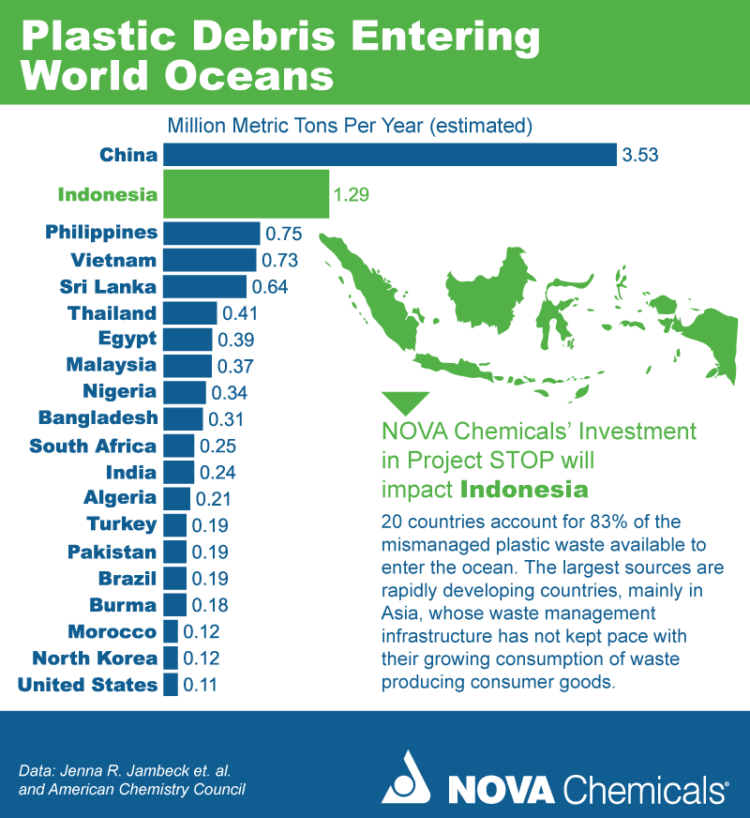
An inherent link to accountability?
You show me a polluter, I’ll show you a subsidy. I’ll show you a fat cat using political clout to escape the discipline of the free market and force the public to pay his production costs.
Robert F. Kennedy, 1960
In the litigation of environmental damage, a key issue in resolving conflict is the inability of states to link accountability to the guilty party. In theory, the ‘Polluter Pays’ principle ensures that the polluters bear the cost of repairing the damage done to the natural environment. Nevertheless, even if there is a visible link between polluters and their payments in relation to a pollution tax or environmental levy and they are legally liable, the trends in environmental orders in recent times have shifted alarmingly. This is due to the notion that in practice, the actual polluter is often ‘no longer around’ or in insolvency.
Therefore, the judiciary in making the distinction between holding the state liable or imposing costs on the community, most often pick the latter. However, picking the pockets of the innocent does not reflect good public policy and may result in a serious erosion of the social contract. Environmental orders are not inherently punitive, as their aim is to ensure the protection of the environment – which makes holding the community liable for damage instinctively unfair.
Even in the ideal scenario that accountability is linked to the polluter, the X-Press Disaster does not allow an advantage for Sri Lanka. The failure of the state to sign and ratify the Hazardous and Noxious Substances Convention is immensely detrimental in the current context. Remaining a signatory to this Convention would have allowed Sri Lanka to claim the maximum amount of damages from the shipping company and the carrier. This failure on the part of the state demonstrates the notion that the ‘Polluter Pays’ principle does not ensure inherent accountability. Alternatively, countries play an important role in the mitigation of risk to the environment and this role cannot be one that is taken lightly.
The futility of enforcement
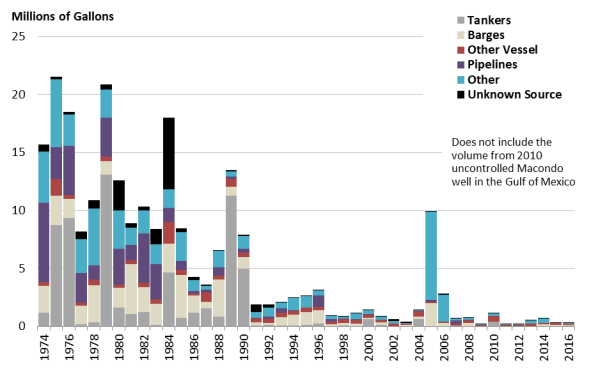
Counterintuitive to the ideal of expanding the scope of liability, certain Conventions play a key role in providing circumstances in which a polluter is exempt from legal responsibility. The International Convention on Civil Liability for Oil Pollution Damage exempts the polluter of liability if the party is able to prove one of the three phenomena; namely that the damage resulted from an act of war, hostilities, civil war, insurrection or a natural phenomenon, the damage was caused by an act or omission done with intent to cause damage by a third party, or the damage was caused by the negligence of a Government or authority responsible for the maintenance of navigational aids.
It is a utopian ideal that the polluter would not seek to oust liability, and this has only been made simpler by enabling Conventions. Additionally, studies demonstrate that the system is utilized as a ‘license to pollute’. This translates to the notion that if the polluter can afford the cost, he has the ‘license’ to pollute. Moreover, liability imposed on polluters is often associated with operational costs and does not reflect the costs associated with remedying damage to the ecosystem. Accordingly, the enforcement of litigation favoring conservation is rendered futile more often than not, and is a contributing factor in dissuading victim states from seeking legal redress.
Recommendations
The greatest threat to our planet is the belief that someone else will save it.
Robert Swan, 2014
While marine pollution cannot be eradicated overnight, it is integral that in ensuring ocean conservation, the systematic drawbacks are addressed, outdated measures nullified, and new and improved steps implemented. Accountability is integral in ensuring ocean conservation. States must ensure that Conventions and signed and ratified in averting the next disaster. Additionally, it is fundamental that an emergency response mechanism is implemented by the state in conjunction with the Marine Environment Protection Authority.
It is mandatory that there is communal advocacy to remedy the environmental damage to the marine environment inclusive of marine ecosystems, coral reefs, mangroves, and lagoons. Organizations such as Ocean Conservatory, Oceana and Green Peace International have been instrumental in the struggle against marine pollution and facilitate shared activism. While the Sri Lankan government has taken elementary steps to remedy the disaster inclusive of filing a $40 Million Claim against the operator of the ship and initiating coastal clean-ups, these actions address what only seems like the tip of the iceberg. A unanimous public outcry demanding that the polluter be held accountable is vital, and may be the only assurance of advocacy for justice in the face of adversity.
Volunteer International is a 501(c)3 tech-nonprofit registered in the United States with operations worldwide. Using a location-based mobile application, we mobilize volunteers to take action in their local communities. Our vision is creating 7-billion volunteers. We are an internationally recognized nonprofit organization and is also a Civil Society Associated with the United Nations Department of Global Communications. Visit our profiles on Guidestar, Greatnonprofits, and FastForward.


